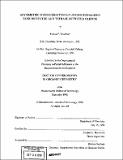Asymmetric hydrogenation of unfunctionalized trisubstituted and tetrasubstituted olefins
Author(s)
Troutman, Malisa V. (Malisa Vaughn), 1970-
DownloadFull printable version (5.798Mb)
Advisor
Stephen L. Buchwald.
Terms of use
Metadata
Show full item recordAbstract
A highly reactive chiral catalyst for the asymmetric hydrogenation of aryl trisubstituted olefins was generated by combining the complex (EBTHI)MMe2 (EBTHI = ethylenebistetrahydroindenyl, M = Ti, Zr) with [PhMe2NH]+[(BC6F5)4]- under a hydrogen atmosphere. A number of unfunctionalized trisubstituted olefins could be hydrogenated rapidly at room temperature under 80 psig H2 with a wide range of ee's (7 97% ). Reduction of some substrates under a deuterium atmosphere revealed that olefins which gave low ee's were being isomerized to 1, 1-disubstituted olefins prior to reduction. In some cases, additional deuterium was introduced at nonolefinic carbon atoms, indicating that the metal complexes also catalyze directed C-H activation. The zirconium-based catalyst was also applied to the first highly enantioselective hydrogenations of unfunctionalized tetrasubstituled olefins. Hydrogenations of l ,2- dimethyi-3,4-dihydronaphthalene proceeded with high enantioselectivity, but were accompanied by side reactions. At 80 - 2000 psig H2, hydrogenations of a number of fully substituted unfunctionalized indenes proceeded cleanly to give mostly cis products with ee's of 78 - 99%; rates and enantioselectivities increased with increasing pressure. Again, deuteration experiments showed that isomerization processes may occur under the reaction conditions.
Description
Thesis (Ph.D.)--Massachusetts Institute of Technology, Dept. of Chemistry, 1998. Includes bibliographical references (leaves 97-98).
Date issued
1998Department
Massachusetts Institute of Technology. Department of ChemistryPublisher
Massachusetts Institute of Technology
Keywords
Chemistry